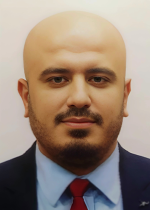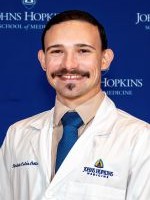ASPET is proud to announce the selection of 13 awardees to participate in the 2025-2026 Washington Fellows program. The mission of the Washington Fellows program is to enable developing and early-career scientists interested in science policy to learn about and become more engaged in public policy issues. Get to know this year’s class.
Nada Ahmed Selim – University of Rochester School of Medicine and Dentistry

Nada was born and raised in Alexandria, Egypt, where she developed an early interest in science shaped by the challenges of local infrastructure. She received her bachelor’s degree in Biochemistry from Mississippi College, where she was also a student-athlete competing in track and field as a pole vaulter. She is now a PhD candidate in Pharmacology and Physiology at the University of Rochester Medical Center under the mentorship of Dr. Andrew Wojtovich. Her research focuses on how metabolism, particularly mitochondrial function, defines neuronal outputs in both physiology and disease, with applications to conditions such as ischemic stroke. Her thesis work is supported by a predoctoral fellowship from the American Heart Association. Outside the lab, Nada has been active in science communication, teaching, and student leadership. She currently serves as adjunct faculty at St. John Fisher University, where she teaches anatomy and physiology. Within her graduate program, she has served as the Pharmacology Student Representative, co-organized student-led seminars, and mentored undergraduate researchers. Through these roles, she has worked to create spaces where young scientists can share their work, learn from one another, and build community.
As a Washington Fellow, Nada hopes to bring her research background, teaching experience, and lived perspective to the policy sphere, with the goal of connecting science to public health challenges and ensuring that biomedical research benefits a wider community.
LinkedIn: Nada Ahmed Selim
Kofi Frimpong-Manson – Texas Tech University Health Science Center

Kofi was born in Ghana and obtained a Doctor of Pharmacy degree from Kwame Nkrumah University of Science and Technology. He pursued a successful career as a certified hospital pharmacist and a retail pharmacist. Within this period, he served as part of the pioneer executive committee of the Early Career Pharmaceutical Group (formerly Young Pharmacists Group) of the Pharmaceutical Society of Ghana. This group was established to advocate for early-career pharmacists in Ghana and provide opportunities to enhance their professional growth. He is currently pursuing a PhD in Pharmaceutical Sciences at Texas Tech University Health Sciences Center under the supervision of Dr. Jenny Wilkerson. His research focus is on the use of preclinical models of chronic migraine to understand the pathophysiology of chronic migraine and to discover novel therapeutics for this debilitating condition. He also studies the neuropharmacology of compounds to manage pain and substance use disorders. Through the ASPET Washington Fellow’s program, Kofi is interested in learning how to apply his experience in clinical pharmacy and preclinical research to play an active role in advocacy for science.
Khalid Garman – National Institutes of Health

Khalid is a physician-scientist and Visiting Fellow at the National Institutes of Health. After earning his medical degree from the University of Tripoli (Libya), he practiced medicine before moving to the United States, where he completed a master’s and PhD in Pharmacology at Georgetown University. Khalid’s research aims to develop novel therapies for rare and aggressive cancers using high-throughput screening platforms. His work has uncovered novel targetable pathways in Merkel cell carcinoma, a rare and highly lethal non-melanoma skin cancer. In addition to research, Khalid is dedicated to teaching and mentorship. He serves as an Adjunct Professor of Pharmacology at Georgetown University and contributes actively to the scientific community through organizations such as the American Society for Pharmacology and Experimental Therapeutics (ASPET) and the Society for Investigative Dermatology (SID).
Lauren Honan – University of Texas Health Science Center at San Antonio

Lauren was born and raised in Vernon, Connecticut, and earned her bachelor’s degree in Biochemistry and Molecular Biology from the University of South Carolina in 2021. There, she discovered her passion for biomedical research and outreach through participation in academic research and fundraising efforts supporting the local children’s hospital. She is currently completing her Ph.D. in Integrated Biomedical Sciences at the University of Texas Health Science Center at San Antonio under the mentorship of Dr. Lynette Daws. Her research investigates the role of organic cation transporter 3 in maintaining serotonin and dopamine homeostasis in the brain, with implications for psychiatric and substance use disorders. This work highlights the transporter’s potential as a novel therapeutic target for treatment of amphetamine-type stimulant use disorders as well as mood and anxiety disorders. Beyond the lab, Lauren is dedicated to science education outreach and actively volunteers with youth programs in the San Antonio community. She will complete her Ph.D. this fall and move to Seattle, Washington in the spring to begin her postdoctoral fellowship. As an ASPET Washington Fellow, Lauren hopes to combine her biomedical research expertise with her passion for science communication and outreach to advocate for policies that strengthen biomedical research funding, infrastructure, and ultimately, public health outcomes in the U.S.
Dawn Jessup – University of Michigan

Dawn Jessup was born and raised in Chesterfield County Virginia, just outside of Richmond City. She received her bachelor’s degree in Forensic Biology with a minor in Chemistry from Virginia Commonwealth University. While studying in the historic city she had the privilege of working in the research lab of Dr. Christopher Ehrhardt on a project which studied the cell membranes of aerosolizeable bacteria as a forensically significant biomarker for applications in counterterrorism and criminal justice. Motivated by this early experience, Dr. Jessup went on to complete her Ph.D. in 2024 at Virginia Commonwealth University’s department of Pharmacology and Toxicology. During this time, she worked under the supervision of Dr. Hamid Akbarali to investigate the efficacy of short-chain fatty acids on drug-induced peripheral pain hypersensitivity in both substance use disorder and chemotherapy. As a graduate student she also organized a recurring seminar series which brought back prominent alumni who had transitioned to non-academic careers in science and government to connect with current students and provide valuable career insights. Now a postdoctoral fellow under the mentorship of Dr. John Traynor at the University of Michigan, her recent work has focused on investigating allosteric modulators of opioid receptors as potential therapeutics for the treatment of opioid induced withdrawal and dependence. In addition to this she also serves on several committees including as a postdoctoral representative to the ASPET Division of Behavioral Pharmacology Executive Committee, as well as mentors and trains undergraduate students, and has been a reviewer for various academic journals. As an ASPET fellow Dr. Jessup hopes to gain new insights into the intersection of public policy and scientific discovery to better advocate for critical research funding and support.
Zari McCullers – Penn State College of Medicine

Zari was born and raised in Frederick, MD and received her Bachelor of Science in Cell and Molecular Biology from Towson University (Baltimore, MD). She was an NIH PREP Scholar at Louisiana State University Health Sciences Center (New Orleans, LA). Zari is currently a 5th year Biomedical Sciences PhD Candidate at Penn State College of Medicine (Hershey, PA) in the Department of Neuroscience and Experimental Therapeutics. Under the direction of Dr. Yuval Silberman, Zari investigates sex differences in diet- and alcohol-induced binge behaviors in mice, focusing on the neuroimmune and neuroendocrine mechanisms underlying these interactions. Her project examines how acute ethanol exposure and glial cell inhibition affect neural activation in the central amygdala. Outside of the lab, Zari is deeply invested in public policy initiatives concerning STEM capacity building and science education. She is versed in program architecture and management, specifically programs focused on research infrastructure, student success, and health equity. A devoted campus leader, she launched and led multiple programs for student success at Penn State College of Medicine, including the Diverse Graduate Student Group (DGSG), Cultivating Underrepresented Students in Science and Public Health (CUSP), Minorities in Medicine (now PRISM-U) and Science Policy, Advocacy, Research and Knowledge (SPARK). She has previously interned at Movement Labs, the National Science Foundation (NSF) and the Center for Environmental Health (CEH). She is currently a Senior Fellow at Women’s Voices for the Earth (WVE) and an Implementation Trainee for Penn State Social Science Research Institute Research-to-Policy Collaboration. As an ASPET Washington Fellow, Zari is eager for a cohort-based space of fellow scientists in pharmacology and experimental therapeutics who are equally driven by policy. She looks forward to gaining skills to translate neuropharmacology research into evidence-based policies that improve access, funding, and patient outcomes.
Kiana Miyamoto – UC San Diego

Kiana was born and raised in Orange County, California. She earned dual bachelor’s degrees in Physiology & Neuroscience and Cognitive Science from the University of California, San Diego, where her undergraduate research experiences sparked a lasting interest in neurobiology and neurological disorders. She went on to pursue a Master of Public Health at George Washington University’s Milken Institute School of Public Health, designing a mental health intervention program that used circus arts workshops to help academic researchers recognize signs of burnout and build community. Kiana then returned to UC San Diego to pursue a PhD in Biological Sciences, shifting her focus to immunology. Her dissertation research examines the causes and consequences of leaky gut during viral infections. Beyond the lab, she is an aerial instructor, student mentor, Nucleate Innovation fellow, science advocate for underserved populations, and a dedicated animal mom. As an ASPET fellow, Kiana hopes to deepen her understanding of the federal policy landscape and prepare for a long-term career at the intersection of translational science, government, and public service.
LinkedIn: Kiana Miyamoto
Rodnie Colón Ortiz – Johns Hopkins University School of Medicine

Rodnie was born and raised in Aibonito, Puerto Rico. He achieved his Bachelor’s degree in Biology with a Minor in Theater at the University of Puerto Rico at Cayey in 2020. His coursework, early research, and poignant life events, such as Hurricane María and personal health struggles, ignited his love for science while highlighting its social duties and responsibilities. Rodnie leveraged his theatrical background to supplement his research training, conduct community outreach, and recruit nationwide high school and undergraduate students for research opportunities. These experiences inspired him to complete a Postbaccalaureate research program at The Ohio State University and pursue a Ph.D. in Neuroscience at Johns Hopkins University School of Medicine. Guided by Dr. Dionna Williams, he evaluates how substance abuse impacts communication between the brain and immune system, which may contribute to the development of substance use disorders and addiction. Beyond the lab, Rodnie continues to mentor undergraduate scholars towards pursuing higher education and careers in STEM, and is passionate about developing strategies to enhance community understanding of biomedical issues and address health disparities. As an ASPET fellow, he aspires to learn how to translate work at the bench into advocacy for evidence-informed drug and public health policy that also targets community engagement and science accessibility rooted in empathy.
LinkedIn: Rodnie Colón Ortiz
Larissa Robinson-Cooper – University of Washington

Larissa was born and raised in Shiawassee County, Michigan. In 2019, she received her bachelor’s degree in neuroscience from the University of Michigan. Through her undergraduate coursework and research experiences, she developed a passion for science with a particular interest in neurobiology of disease. Following graduation, she worked as a research technician in the lab of Dr. Lori Isom, studying Dravet Syndrome, a rare and severe pediatric epilepsy. Her experience as a first-generation college graduate inspired her to pursue a career in science communication, education and outreach which motivated her to seek higher education. She is currently pursuing a Ph.D. in neuroscience at the University of Washington under the mentorship of Dr. Melissa Barker-Haliski. Her research is focused on uncovering the molecular mechanisms that lead to increased seizure susceptibility in those with early onset Alzheimer’s disease. Outside of research, she has been involved in several science communication and outreach initiatives such as classroom visits at local K-12 schools and the Neuroscience Community Outreach Group’s annual Brain Awareness Week Open House at the University of Washington. As an APSET Washington fellow, Larissa hopes to learn how to apply her experience in research and science communication to advocating for funding for life-saving research and science education.
Sophia Salbato – University of California, Davis

Sophia was born in Southern California and raised in Albuquerque, New Mexico. She received her bachelor’s degree in Biology with a minor in Chemistry from the University of New Mexico, where she discovered her passion for research through participation in two undergraduate research programs and her work as a tutor and peer mentor. Following graduation, she moved to Northern California to pursue a Ph.D. in Molecular, Cellular and Integrative Physiology at the University of California, Davis. In the laboratory of Dr. Madeline Nieves-Cintrón, her research focuses on understanding the effects of acute and chronic exposure to e-cigarette vapor on cardiovascular function. Beyond the bench, she has been actively involved in graduate student leadership, serving on multiple student committees and as the sole student representative on her program’s Admissions Committee, experiences that have strengthened her commitment to advocacy. As an ASPET Washington Fellow, Sophia hopes to draw on both her research training and leadership experience to advocate for increased funding to support scientist training programs and biomedical research.
Sherouk Tawfik – University of Connecticut

Sherouk is from Cairo, Egypt, where she earned her bachelor’s degree in Pharmacy from Ain Shams University and master’s degree in Biochemistry from the American University in Cairo. Throughout her undergraduate and graduate studies, she developed a deep passion for scientific research and advocacy, gaining experience in translational research, teaching, and international collaborations. Sherouk is currently pursuing her PhD in Pharmacology at the University of Connecticut. Under the mentorship of Dr. Xiao-bo Zhong, her research focuses on optimizing liver-targeted small interfering RNA (siRNA) therapeutics for metabolic diseases, including metabolic dysfunction-associated steatotic liver disease (MASLD) and hypercholesterolemia. She investigates how intracellular factors, such as fatty acid levels, influence siRNA efficacy, and explores how lipid-lowering agents, such as statins, affect target-mediated gene silencing. Her expertise spans both academia and industry. She completed internships at Genentech in Clinical Pharmacology and at Eli Lilly and Company in PK/PD modeling, is a licensed pharmacist, and has taught as an Assistant Lecturer of Pharmacology and Biochemistry at the British University in Egypt. Her scientific contributions have been recognized internationally, including receiving the Best Presenter Award from the International Society for the Study of Xenobiotics. Beyond research, Sherouk is dedicated to science policy, leadership, and mentorship. She was the first Egyptian fellow at the Hansen Summer Institute for Leadership and International Cooperation and currently serves as President of the Pharmacology and Toxicology Graduate Student Union. As an ASPET Washington Fellow, Sherouk aims to leverage her research, industry experience, and leadership skills to bridge the gap between scientific discovery and public policy, advocating for legislation that advances biomedical research, promotes inclusivity, and ensures equitable access to scientific innovation.
LinkedIn: Sherouk Tawfik
Drew Theobald – East Carolina University

Drew is from Surprise, Arizona and received her bachelor’s degree in biology from Ottawa University Arizona before pursuing a master’s degree in biomedical science at East Carolina University under the mentorship of Dr. Srinivas Sriramula. As a master’s student, she discovered a passion for biomedical research that motivated her to continue into the PhD program at East Carolina University in the Department of Pharmacology and Toxicology, where she remains under Dr. Sriramula’s guidance. Drew was awarded an American Heart Association Predoctoral Fellowship to study neuroimmune mechanisms underlying hypertension, with a particular focus on the interaction between kinin B1 receptors and Toll-like receptor 4 in the central regulation of blood pressure. Drew has had the opportunity to represent East Carolina University at the North Carolina Graduate Education Day, where she engaged directly with state legislators to advocate for the value of graduate research. As an ASPET Washington Fellow, Drew hopes to further improve her science communication skills to effectively advocate for the importance of biomedical research and bridge the gap between benchtop research and science policy.
Monica Tschang – University of Washington

Monica grew up in New Jersey, but was technically born in New York, so that's where she tells non-East Coasters she's from. She completed her bachelor's degree in Cell Biology and Neuroscience from Rutgers University, where she also developed her passion for science communication. Her neuroscience outreach initiatives and 3.5 years of spinal cord injury research experience under Drs. Victoria Abraira and Melitta Schachner helped her get into grad school at the University of Washington. She is currently in her 4th and final year of her Neuroscience PhD under the mentorship of Dr. Abbie Schindler, a previous ASPET fellow. Her research explores the role of the gut-brain connection and microbiome in the context of trauma. In addition to her research, Monica leads a science outreach program that collaborates with local schools, produces a science comedy show, mentors prospective graduate students from underrepresented backgrounds, and facilitates science communication workshops for trainees. While she seeks to offer educational experiences and resources to the public and young scientists through her outreach efforts, her research in gut and mental health inspires her interest in food and health policies. As an ASPET fellow, Monica hopes to learn how to navigate the government funding landscape to better advocate for expanding access to educational, emotional, and nutritional support for students of all backgrounds.